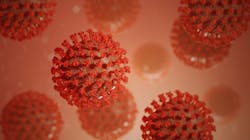FDA and global partners to analyze SARS-COV-2 for diagnostics, vaccines, and therapeutics development
In the Medical Countermeasures Initiative (MCMi) regulatory science project, the University of Liverpool (ULIV) and international partners will analyze SARS-CoV-2, SARS-CoV, and MERS-CoV clinical samples, collected through global partnerships, to better understand coronavirus evolution and virulence, characterize host-pathogen interactions and immunity, and identify biomarkers of disease progression and severity, reported the U.S. Food and Drug Administration (FDA).
Since there are currently no licensed therapeutics or vaccines to prevent or treat infections from these specific viruses or coronaviruses in general, there is an urgent need to support development and evaluation of relevant medical countermeasures (MCMs). Through the sequence analysis of current and ongoing collection of samples from humans and animals, this project will help inform the real-time performance of molecular-based diagnostics (e.g., genetic drift that may evade the current molecular diagnostic tests).
This project also has the potential to provide a better understanding of vaccine and therapeutic targets, including biomarkers of protection, potential development of antiviral resistance, and host-directed therapeutics for a broad range of coronaviruses. The pattern of severe disease in COVID-19 is similar to both MERS and SARS, particularly with regard to an enhanced and overt host inflammatory response. This will be investigated and compared in human and animal models. Identification of potentially common pathways would provide necessary information for development of host-directed MCMs.
The project will also examine in vitro models of coronavirus infection, including human organs-on-chips, to elucidate how these models compare to in vivo responses in animal models and humans. Ultimately, these in vitro models will result in enhanced MCM screening methods.
Collaborators include:
· Public Health England, UK University of Bristol, UK
· King Fahad Medical City, Saudi Arabia Agency for Science, Technology, and Research (A*STAR), Singapore University of Oxford, UK
During this project, the University of Liverpool and international partners listed above, will perform RNA sequencing and immunological analysis of samples from patients who were infected with SARS-CoV-2, SARS-CoV, and MERS-CoV during the 2019-20 pandemic and outbreaks in 2003-2004 (SARS-CoV) and MERS-CoV (since 2012). The project will use a biobank of diverse samples from humans with these infections and compare their response to relevant animal models and in vitro systems being used to develop MCMs.
Major objectives of this project include:
· Characterizing viral genetics during infection and identifying whether sites targeted by diagnostics and therapeutics are under selection pressure. This will also assess whether the major drivers in evolution are mutation and/or recombination; the latter is a natural byproduct of coronavirus RNA synthesis.
· Assessing the host response to mild and severe coronavirus infection and identifying any commonalities and differences. This will correlate observations in humans with findings from relevant animal models used in the development of MCMs. Here machine learning approaches will be used to interrogate the large datasets generated and identify patterns.
· Further characterizing the properties of SARS-CoV-2 and MERS-CoV in cell culture with a specific focus on cell lines and systems used for screening candidate MCMs.
· Developing and assessing organs-on-chips technology for investigating severe coronavirus infection and their application to MCM evaluation. This will use the data generated in the previous objectives for both human infections and animal models.
The primary planned outcomes of this project are to:
· Identify viral evolution in longitudinal samples (nasal aspirates/blood/plasma) taken from patients with MERS-CoV and SARS-CoV-2 using Illumina, PacBio, and Oxford Nanopore-based technologies.
· Identify host biomarkers and immune responses through gene and protein expression patterns, using RNAseq, long read sequencing, proteomics, machine learning, digital cell quantification, cytometry, and multiplex tissue imaging in longitudinal samples taken from patients with SARS-CoV, MERS-CoV, and SARS-CoV-2 with metadata including clinical information on disease progression and outcomes.
· Characterization of in vitro host pathogen interactions and comparison to in vivo responses for SARS-CoV, MERS-CoV, and SARS-CoV-2. This will range from using traditional continuous cell culture models for benchmarked high-throughput analysis to three-dimensional culture from clinical samples to emerging technologies such as organs-on-chips and marrying with approaches including CODEX.
